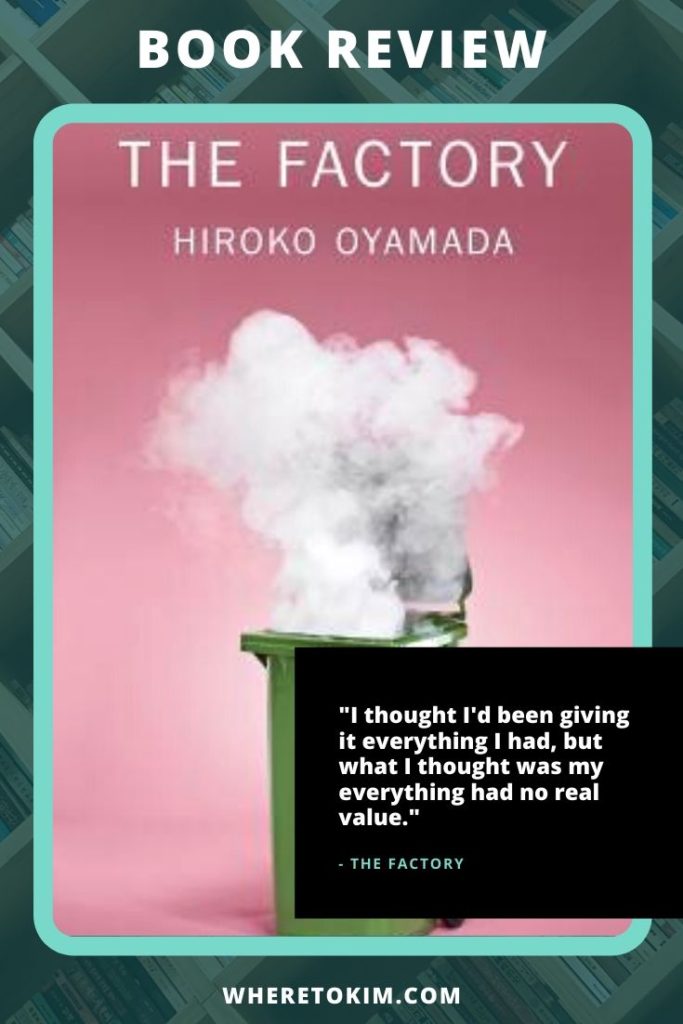The Japanese author Hiroko Oyamada has the uncanny skill to turn you into one of the main characters of the book. When reading The Factory you feel like they feel: there is no escaping The Factory.
The Factory Synopsis
In an unnamed Japanese city, three seemingly normal and unrelated characters find work at a sprawling industrial factory. They each focus intently on their specific jobs: one studies moss, one shreds paper, and the other proofreads incomprehensible documents. Life in the factory has its own logic and momentum, and, eventually, the factory slowly expands and begins to take over everything, enveloping these poor workers. The very margins of reality seem to be dissolving: all forms of life capriciously evolve, strange creatures begin to appear… After a while—it could be weeks or years—the workers don’t even have the ability to ask themselves: where does the factory end and the rest of the world begin?
Told in three alternating first-person narratives, The Factory casts a vivid—if sometimes surreal—portrait of the absurdity and meaninglessness of modern life. With hints of Kafka and unexpected moments of creeping humor, Hiroko Oyamada is one of the boldest writers of her generation.
Book review
“The far end of the corridor had an ominous sound to it, like the place was reserved for dead-end employees.” Also known as our three main characters. One of the Ushiyama siblings is a proof reader of irrelevant texts and the other a shredder of papers that aren’t important. “Seriously, though, I love my job. Shredding really unleashes the artist in me.” Very funny, Yoshiko. The moss specialist Furufue is the odd one out being tasked with green-roofing the factory, a job that seems meaningful and important at first. When? Whenever… take your time.
Work is a prison you can’t escape from, even though it is part of the world but not of you. “I thought I’d been giving it everything I had, but what I thought was my everything had no real value.” When you can’t do anything that a machine can’t do better it makes no sense to get out of bed in the morning for a salary you feel you don’t deserve. They keep saying they have to count their blessings, because it isn’t physical labor. Yet they don’t see that the mental drain of what they do is worse for them. They keep thinking that they could have ended up much worse, but the reader is not fooled. Could you live a meaningless life? Are you doing it?
You can feel the hopelessness of their existence which is even more pronounced whenever the cheerful (on the outside) Goto makes an appearance. It hurts to see the contrast. “But that didn’t change the fact that Goto was apparently totally useless.” Poor Goto. The onboarding Goto gives our three main characters is terrible. Has anyone seen the Korean TV Drama Misaeng? Let’s do better in real life.
The Factory by Hiroko Oyamada turns me into one of the main characters wasting their time by making me read about Graybacks and Washer Lizards and Factory Shags… I don’t care. I understand the meaning behind the animals; the author clearly put some symbolism into the story, but it was too weak to impress me. It left me wanting for something stronger, something with more meaning, fulfilling my own need for a meaningful past-time. Kudos to the author for making the reader feel what the characters feel, though, but I don’t want to feel bored while reading. And I certainly don’t want to feel miserable on a Sunday evening right before the new work week starts.
As for the meaning of the story: the black birds symbolize office workers in general and the three animals our three main characters. They never wander far from where they reside and work. In the north zone where the ‘important’ employees work the trees are green with life year-round, but in the south zone they are yellow and dying, if not bare and dead. From document creation to proofreading to shredding, their jobs cover a paper’s lifecycle. And then it starts all over again, forever and ever. Time is not of importance in the book, nor is the order of affairs.
“It was all so big, and I was a part of it – it had a space for me, a need for me.” Just live in the factory. The Factory is life.
Translated from Japanese by David Boyd.
Interested?
You can get your copy of The Factory from Amazon.







